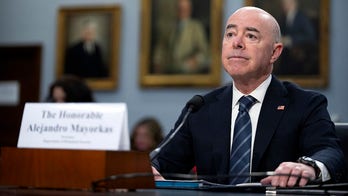A report that another provision of ObamaCare -- one that would cap out-of-pocket health care costs -- was being delayed brought a defiant challenge Tuesday from a top Senate Republican, accusing the president of "illegal and unconstitutional" acts in changing laws without congressional approval.
"The president doesn't get to write legislation, and it's illegal and unconstitutional for him to try and change legislation by himself," Sen. Rand Paul, R-Ky., told Fox News.
The New York Times first reported on Tuesday that the administration is giving some insurers and employers a one-year grace period to adhere to the limit, which otherwise would have capped individual costs at $6,350 a year. The full requirement will go into effect in 2015, rather than 2014. The change means some employers -- namely, those with more than one benefit provider -- could use plans with higher limits or no limit at all on out-of-pocket costs during that period.
The grace period apparently was granted earlier this year, though was buried in reams of regulatory material and was not publicly reported until now. Department of Labor guidelines published in February had addressed the delay.
The confirmation comes weeks after the administration announced it was delaying a key insurance mandate -- the requirement on mid-sized and large businesses to provide coverage to full-time workers. The mandate, and the cap on costs, were both delayed for one year, in a move officials claimed was meant to give businesses more time to prepare.
According to the Times, the decision to delay the cap on costs was made because many employers said they needed to upgrade their computer systems. The issue was they used different systems to administer both medical coverage and drug coverage, and they were not set up to "aggregate" all the money an individual spends out of pocket.
As a consequence of the delay, some health plans in 2014 will be able to keep separate caps for both medical care and drug plans, or have no cap at all on drug costs.
In response to the report, an Obama administration official stressed that the cap on individual spending for "major medical coverage" will still be in place in 2014, "on time." It will then be expanded to cover other benefits the following year.
"For the first time, new historic consumer protections under the Affordable Care Act will protect consumers from the worst insurance company abuses, by banning discrimination based on a pre-existing health conditions, ending lifetime and annual limits on what an insurance company will cover, and capping out-of pocket spending to protect Americans and their families," the official said.
The decision raises concerns that, at least for next year, the health care law will not save people as much money as President Obama claimed. On the campaign trail, Obama has touted caps on out-of-pocket costs as a selling point.
Insurance companies could still raise premiums to offset some of the lost revenue from caps on out-of-pocket costs. The law, though, does aim to keep premium increases in check, and barring any other delays would still prevent health insurers from denying coverage or charging more based on pre-existing conditions.
The delay opened the door to more criticism from Republicans who say the law is not ready for prime-time -- and ultimately want it repealed anyway.
Sen. John Barrasso, R-Wyo., pointed to the delay in reviving his call to "start over" on the law.
"The reason this law keeps getting delayed is because it doesn't work like the President promised it would work," he said in a statement.
The administration maintains it is able to make adjustments to the implementation of any law.
Obama defended the law, and its implementation, during a press conference last Friday. He blasted Republicans for their sustained campaign against the law, saying "there's not even a pretense now that they're going to replace it with something better."
"It's just become an ideological fixation," Obama said, adding: "There is no doubt that in implementing the Affordable Care Act, a program of this significance, there are going to be some glitches. ... That's true, by the way, of a car company rolling out a new car. It's true of Apple rolling out the new iPad."





